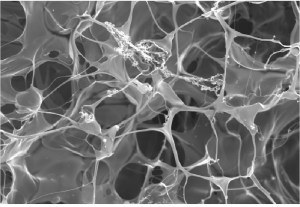3D culture scaffold for cancer cells

Cancer cells growing in BIOMIMESYS® Oncology hydrscaffold proliferate and aggregate to form spheroids from the 5th day of culture.
Extracellular matrix (ECM) is a complex viscoelastic system composed of various distinct components (GAG, Collagen…) that are often organized into a fibrillar microstructure.
The physicochemical properties (composition and architecture) of the ECM play a critical role in regulating important cellular functions such as spreading, migration, proliferation, and differentiation.
To better mimic the tumor microenvironment, HCS Pharma develops BIOMIMESYS® Oncology , a double interpenetrating network (IPN) hydroscaffold based on Hyaluronic acid (HA) and type I collagen crosslinked with Adipic acid dihydrazid (ADH).

SEM observation of a BIOMIMESYS® Oncology: section magnification
Spheroid growth, Viability, Cell proliferation
BIOMIMESYS® Oncology hydroscaffold provides cell binding sites with CD44 and RHAMM allowing cell-matrix and cell-cell interactions.
Cancer cells growing in BIOMIMESYS® Oncology hydrscaffold proliferate and aggregate to form spheroids from the 5th day of culture. The size and formation of the spheroids varies as a function of:
- Seeding density
- Length of culture
- Cell type
The cells can be cultured for at least 28 days.

Colorectal cancer cells grown in BIOMIMESYS® Oncology
HTC-116 Cells – Day 15 – DAPI (blue) MitoTracker (Yellow) Edu (Green)

